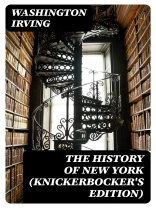In ‘The History of New York, ‘ Washington Irving blends history, satire, and social commentary in a masterful narrative that humorously chronicles the early Dutch settlement of New Amsterdam. Presented through the fictitious persona of Diedrich Knickerbocker, this work employs a playful literary style characteristic of early-American literature, marked by its engaging anecdotes, vivid characterizations, and a lighthearted approach to serious historical events. Irving not only documents the formative years of New York City but also critiques the emerging American identity during the early 19th century, deftly intertwining fact and fiction to captivate his readers. Washington Irving, a prominent figure in American literature, was deeply influenced by his experiences in New York and his fascination with its diverse cultures. His tenure in Europe and rich exposure to the literary traditions there further shaped his narrative style, allowing him to infuse humor and poignancy into his storytelling. Irving’s literary pursuits coincided with a burgeoning sense of nationalism, prompting him to explore themes of heritage and identity through the lens of New York’s complex colonial past. This book is an essential read for those interested in the development of American literature and history. Irving’s unique blend of fact and fiction not only entertains but also offers profound insights into the American psyche. ‘The History of New York’ remains relevant, inviting contemporary readers to reflect on the complexities of identity and cultural evolution.
About the author
Washington Irving (1783–1859) stands as a central figure in early American literature, most known for his short stories such as ‘The Legend of Sleepy Hollow’ and ‘Rip Van Winkle, ‘ but also for his satirical works that captured the culture and humor of his society. Born in New York City, Irving cultivated a keen interest in the art of writing which blossomed into a distinguished literary career. His seminal work, ‘The History of New York from the Beginning of the World to the End of the Dutch Dynasty’ (published under the pseudonym Diedrich Knickerbocker), is a satirical and largely fictionalized account of New York’s history. This work not only introduced the Knickerbocker character, which became synonymous with New Yorkers but also laid the foundation for the city’s enduring cultural mythology. Irving’s literary style often interweaved satire with a Romantic celebration of the American landscape and tradition. Throughout his life, he earned recognition for his versatile command of satire, pathos, and historical narrative. Irving’s distinguished status in American literature was further cemented by his appointment as a diplomatic official in Spain, where his experiences would influence subsequent writings. He has been called ambassador-at-large to the world for American culture and the first American author to achieve international fame, signalling the maturation of American literature in the early 19th century.












